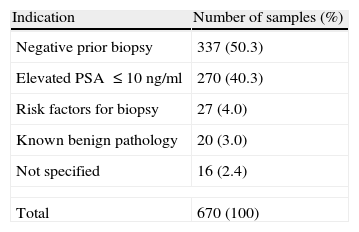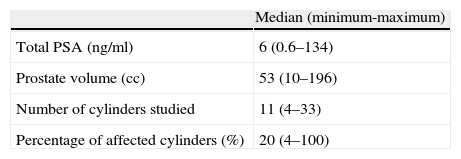Analyze the impact of the introduction of the study of PCA3 gene in post-prostatic massage urine in the clinical management of patients with altered PSA, evaluating its diagnostic ability and predictive value of tumor aggressiveness.
MethodsObservational, prospective, multicenter study of patients with suspected prostate cancer (PC) candidates for biopsy. We present a series of 670 consecutive samples of urine collected post-prostatic massage for three years in which we determined the «PCA3 score» (s-PCA3). Biopsy was only indicated in cases with s-positive PCA3.
ResultsThe s-PCA3 was positive in 43.7% of samples. In the 124 biopsies performed, the incidence of PC or atypical small acinar proliferation was 54%, reaching 68.6% in s-PCA3≥100. Statistically significant relationship between the s-PCA3 and tumor grade was demonstrated. In cases with s-PCA3 between 35 and 50 only 23% of PC were high grade (Gleason≥7), compared to 76.7% in cases with s-PCA3 over 50. There was a statistically significant correlation between s-PCA3 and cylinders affected. Both relationships were confirmed by applying a log-linear model.
ConclusionsThe incorporation of PCA3 can avoid the need for biopsies in 54% of patients. s-PCA3 positivity increases the likelihood of a positive biopsy, especially in higher s-PCA3 100 (68.6%). s-PCA3 is also an indicator of tumor aggressiveness and provides essential information in making treatment decisions.
Analizar el impacto de la introducción del estudio del gen PCA3 en orina posmasaje prostático, en el manejo clínico de pacientes con PSA alterado, valorando su capacidad diagnóstica y predictiva de agresividad tumoral.
MétodosEstudio observacional, prospectivo y multicéntrico de pacientes con sospecha de adenocarcinoma de próstata (AP) candidatos a biopsia. Presentamos una serie de 670 muestras consecutivas de orina posmasaje prostático recogidas durante 3 años en las que se determinó el «score de PCA3» (s-PCA3). Se indicó biopsia únicamente en los casos con s-PCA3 positivo.
ResultadosEl s-PCA3 fue positivo en el 43,7% de las muestras. En las 124 biopsias realizadas, la incidencia de AP o proliferación microacinar atípica fue del 54%, llegando al 68,6% en s-PCA3≥100. Demostramos relación estadísticamente significativa entre el s-PCA3 y el grado tumoral. En los casos con s-PCA3 positivo pero inferior a 50, solo el 23% de AP fueron de alto grado (Gleason≥7); en cambio, en los casos con s-PCA3 superior a 50 lo fueron el 76,7%. La relación entre el s-PCA3 y el porcentaje de cilindros afectados en la biopsia fue significativa. Ambas relaciones se confirmaron al aplicar el modelo log-lineal.
ConclusionesLa incorporación del PCA3 permite prescindir de la biopsia en un 54% de los pacientes. La positividad del s-PCA3 aumenta la probabilidad de biopsia positiva, especialmente en s-PCA3 superior a 100 (68,6%). El s-PCA3 es también un indicador de agresividad tumoral y aporta información esencial en la toma de decisiones terapéuticas.










